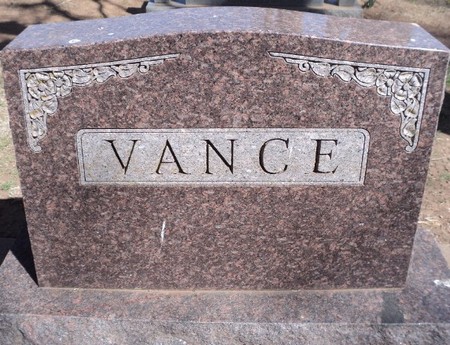


 |
 |  |


|
Enid News and Eagle, dated November 13, 2021
Vance (Medal of honor) and Brittain (Waukomis cemetery) -- article in "The ultimate sacrifice" in the 11-13-2021 News and Eagle...
The Ultimate Sacrifice
This column first appeared Oct. 15, 2010
On the northeast end of Government Springs Park rests an engraved memorial to the gallant members of the armed forces from Garfield County who gave their lives during American wars, from the Great War up through World War II, Korea, Vietnam and Iraqi Freedom.
There you'll find the name of Leon Robert Vance Jr., the Medal of Honor winner from Enid, whose well-documented sacrifice to his country was recognized when Vance Air Force Base was renamed in his honor.
Vance was flying in a B-24 Liberator during a bombing raid against the Germans in support of the D-Day landings in early June 1944, when he took over the pilot's duties of his crippled aircraft. Despite a mangled foot wedged under the co-pilot's seat, Vance - believing one member of his crew who had not bailed out of the plane was too injured to parachute - crash landed his wounded Liberator in the English Channel.
While being sent back to the U.S. to recover from his injuries, his plane disappeared over the Atlantic Ocean between Iceland and Newfoundland, and his body never was found.
Tucked into the south end of Waukomis Cemetery is a modest grave marker with a story no less heroic, nor less poignant than that of Lt. Col. Vance. The marker reads: "Robert Neil Brittan, lieutenant colonel infantry, who died in the service of his country Southwest Pacific area, Oct. 24, 1944. Born Waukomis, Oklahoma, Sept. 4, 1910." Of course, Lt. Col. Brittan is not buried in the old tree-lined graveyard. It is a simple memorial to him. He is buried in that great expanse of Pacific waters known as the South China Sea.
Brittan was among the 24,000 Americans stationed in the Philippines taken as prisoners of war by the Japanese during the early days of World War II. Brittan had been with the American Army on the Bataan Peninsula, on Luzon in the Philippine Islands, when it was surrendered in April 1942. Gen. Douglas MacArthur, commander of all troops there, left the Philippines and Corregidor with the famous words, "I shall return."
For Lt. Col. Brittan and the other Americans taken captive, it was an unspeakable hell, in which prisoners were forced to march 86 miles to Camp O'Donnell on the infamous Bataan Death March. Along the way they were treated with the utmost in brutality by their guards - the men randomly beaten, denied food and water in the blazing tropical sun. Those who fell were left to die. A soldier breaking ranks to get water was executed on the spot, many times beheaded by sword blade. The route was littered with the bodies of American and Filipino soldiers. Of the 75,000 soldiers on the death march, only 54,000 reached Camp O'Donnell. After MacArthur and American forces landed in the Philippines in October 1944 to retake the islands, the Japanese made the decision to move as many American POWs as possible from Bilibid Prison in Manilla to Japan on unmarked transport ships. Lt. Col. Brittan and 1,800 other Americans were crammed into the Arisan Maru, one of the so-called "hell ships" Japan used in moving prisoners.
Placed into the ship's hold, in standing-room-only conditions, the prisoners again were subjected to the hellish treatment of their Japanese captors, as bad or worse than they had endured during the Bataan Death March. On its voyage to Japan, the Arisan Maru steamed through the Bashi Straits in the South China Sea. Nine American submarines were patrolling the area, looking to sink any Japanese supply ships traversing the waters. Not knowing the Arisan Maru carried American P.O.W.s, the submarine USS Snook officially was credited with torpedoing the Japanese freighter on Oct. 24, 1944. As it began to sink, Japanese destroyers picked up the crew, but pushed away and beat with poles any Americans trying to swim to safety. Most, however, drowned as the Arisan Maru sank, still locked in the hold of the freighter.
History still is unclear which submarine sank the Arisan Maru. The USS Shark II also could have torpedoed the Japanese ship, but was lost with its entire crew of 87 men that same day off Taiwan. Lt. Col. Robert Neil Brittan, born and raised in Waukomis, was one of the 1,781 men who died at sea that October day - only nine Americans survived to tell their story.
As a youngster, I still remember walking past what everyone called the old Brittan place, tucked into trees and thick evergreens at the south end of Waukomis' Main Street on what then was Drummond Road. I didn't know of the tragic, heroic tale of one of our former residents, who somehow lived through two years of hell as a Japanese prisoner, and made the ultimate sacrifice for his country.
Christy is news editor at the Enid News & Eagle. Visit his column blog at www. tinyurl.com/Column-Blog.
|V Surnames - Waukomis Cemetery| |Garfield County Page| |Home|
This site may be freely linked, but not duplicated in any way without consent.
All rights reserved! Commercial use of material within this site is prohibited!
© 2000-2024 Oklahoma CemeteriesThe information on this site is provided free for the purpose of researching your genealogy. This material may be freely used by non-commercial entities, for your own research, as long as this message remains on all copied material. The information contained in this site may not be copied to any other site without written "snail-mail" permission. If you wish to have a copy of a donor's material, you must have their permission. All information found on these pages is under copyright of Oklahoma Cemeteries. This is to protect any and all information donated. The original submitter or source of the information will retain their copyright. Unless otherwise stated, any donated material is given to Oklahoma Cemeteries to make it available online. This material will always be available at no cost, it will always remain free to the researcher.